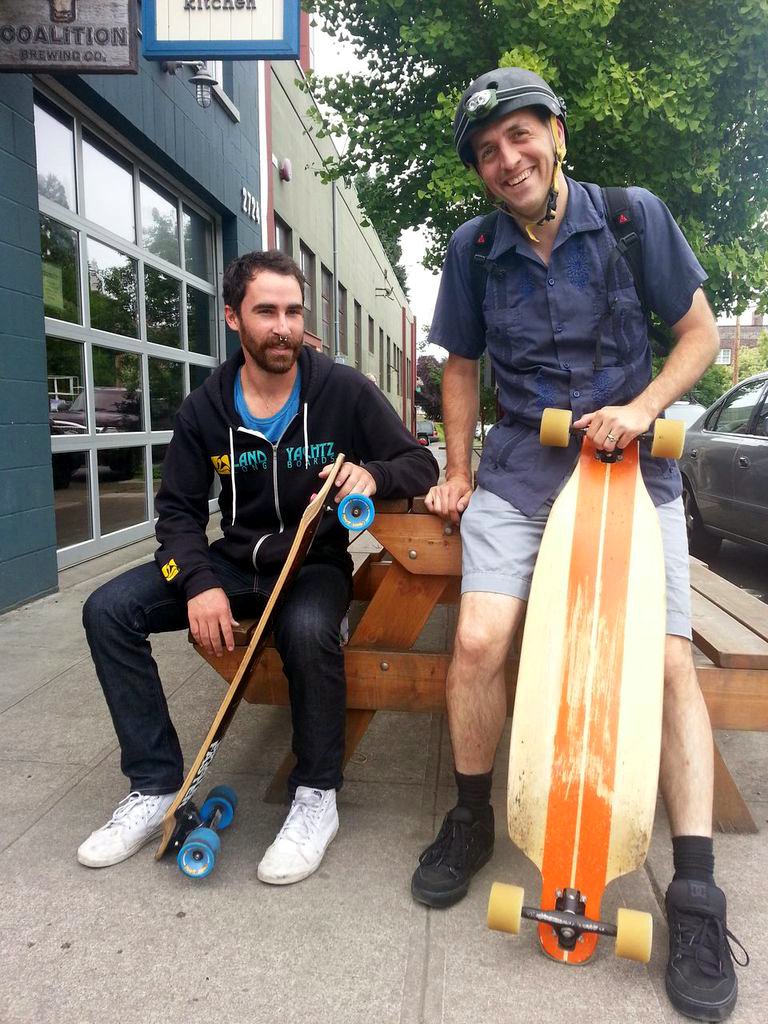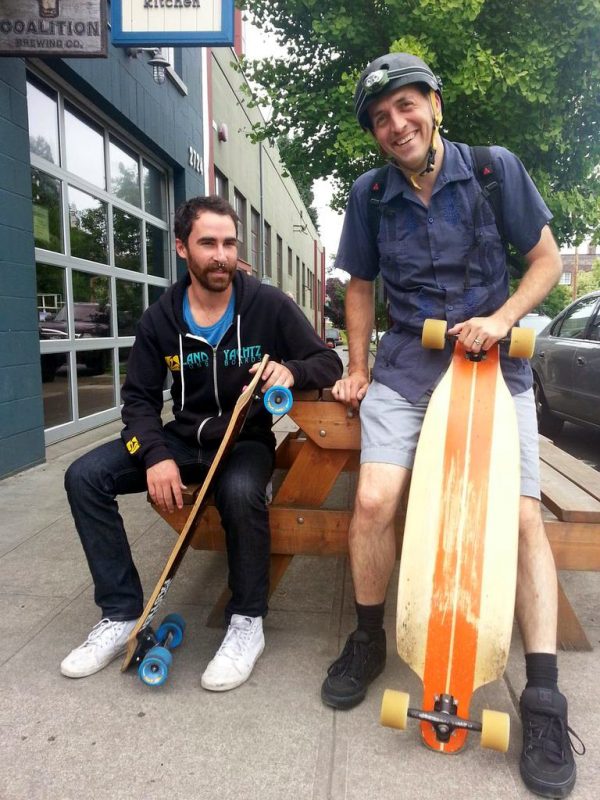
(Photo © M. Andersen/BikePortland)
Forty years after Oregon started taking bicycle transportation seriously, a new group for people who get around by skateboard says it’s another vehicle’s turn.
The NW Skate Coalition, organized last fall in the wake of public controversy over downhill skating in the West Hills, is looking for new ways to persuade Portlanders that four polyurethane wheels and a maple board add up to a pretty good idea.
And anyone who’s watched the growth of biking in Portland will recognize their agenda.
There’s skate fun: The third annual Skate Critical Mass is tonight at 6 p.m. in Tom McCall Park. There’s government recognition: they recently met to talk skateboarding with Mayor Charlie Hales’ policy advisor. There’s in-school education: they’re hoping to take part in the local Safe Routes to School program.
NWSC co-founder Cory Poole is even participating in next month’s Disaster Relief Trials on his longboard … and thinking about joining an upcoming move by bike, too.
It’s an urban transportation movement that seems well-suited to Portland, which in 2000 decriminalized skateboarding on city streets after an uphill campaign by then-Transportation Commissioner Hales.
“Riders of such devices are subject to the provisions applicable to, and have the same rights and duties provided any driver of a vehicle … except when otherwise specifically provided.”
— from the Portland City Code regulation of skateboards
“No one’s looking at this as a viable transportation solution for urban areas,” said Poole, 36, in an interview Thursday. “They kind of put up with it. They deal with it. [But] I don’t think many cities other than Portland have said, ‘This is not just something we should deal with but something we can use.'”
Billy Meiners, another NWSC co-founder (and also a founder of popular skateboarding website PDX Downhill), said that after years of successful short-term civic activism projects, Portland’s skating community deserves more sustained, strategic effort on its behalf.
“There’s plenty of groups that are like, ‘We need a skate park,'” said Meiners, 27. “The skate park’s built and it’s like, ‘We’re done.'”
Though Poole and Meiners say they don’t aspire to create a large professional organization like the Bicycle Transportation Alliance, they’ve looked to Oregon’s 23-year-old bike advocacy group as a model of effectiveness and professionalism. They also look at Portland’s increasingly diverse bike culture and see the future of the skateboard scene.
“I don’t see there being a 25 percent mode share for skateboards ever,” Poole said. “But [on an errand] I’ll see two, three skateboards and maybe eight, nine bicycles. That’s a lot of skateboards.”
By almost any measure, skateboarding and longboarding are cheap. A decent board costs $100, plus less than $100 per year in replacement wheels and ball bearings.
Last month, Portland State University scholar Tessa Walker presented work from a master’s thesis about skateboard transportation in Portland as part of the school’s transportation seminar series. Walker found that although “skating is still primarily, at least in terms of this sample, young white men … I got a lot more diversity than I was expecting in terms of age.”
Poole and Meiners say that gradually improving skateboard technology, such as more complicated trucks and softer wheels, is making boards more comfortable and luring older people to see them as practical.
“There’s no reason to age out of longboarding,” said Poole, who lives in Portland and commutes to Salem as a property manager. “I literally go years between falls. If you’re just using it as transportation, you don’t need to fall ever. It’s a freak incident if you fall.”
Walker’s research also found that an entire generation of skaters, Poole included, like to ride with their children. Nineteen percent of her survey respondents reported doing so.
“It’s something I can do to remain connected with my teen boys,” one man told Walker. “I reward them for Bs or above with predawn sessions.”
Another finding Walker drew on in her research: a 1979 study found that one-third of all skateboard-related ER visits in Toronto came from people who’ve been skateboarding for less than a week.
Poole and Meiners hope that’s one statistic the NW Skate Coalition will be able to change, by making skateboard education more common. They’re currently focused on organizing occasional events, building relationships in the local skating community and getting to know police, schools and other local government institutions.
“Most of the policy people I talk to, after I talk to them and a couple months pass, I talk to them again, and they’re like, I’ve been noticing so many skateboards!” Poole said. He laughed. “No, they were there all along.”

